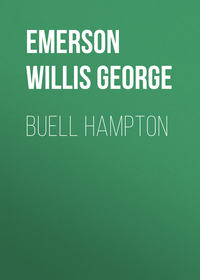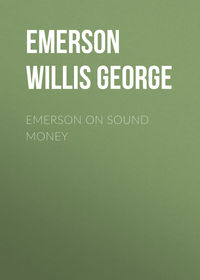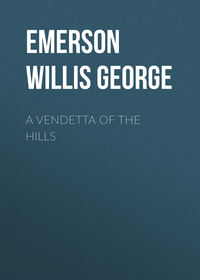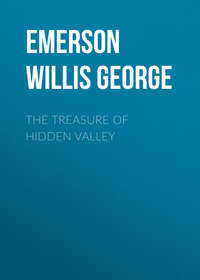 полная версия
полная версияMy "Pardner" and I

Willis George Emerson
My «Pardner» and I / Gray Rocks, A Story Of The Middle-West, Illustrated
The breaking of a twig in some vast forest, or the dull echo of a miner’s pick in a rugged mountain canyon, alike suggest the solitude of Nature. The unwritten history of mining prospectors who search for yellow gold, or the advance guards of our civilization in the rich valleys of the West, are replete-with interest and dramatic incident. The “boom” town builder also plays a most conspicuous part in this unwritten drama.
There are no frayed-out remnants of a former greatness to be found on the frontier. A man sells for his intrinsic worth – no more, no less. Conditions that made men great in former generations are here active. and develop manhood in its highest form.
There is hardly a cross-road hamlet without its hotel, and usually a “Dick Ballard” presides. “Brainy men.” such as composed the Waterville Town Company, may be found wherever a new town is building, while a “Rufus Grim” is usually the autocrat of the mining camp.
The old “Colonel” represents a class of sturdy miners whose untiring labor occasionally gives to the world the golden keys of some fabulously rich discovery; while the greater number dedicate their lives to a fruitless search for hidden treasures, and finally die of disappointment and a broken heart.
“Louise,” in her unswerving devotion to her father, is a specimen of superior womanhood whose duplicate may be found in many a ranchman’s home throughout the nestling valleys of our y re at West.
Sometimes I imagine I was with “J. Arthur Boast” in his hiding place when he wrote that last letter and saw the spectral ghost that ever kept him company. The retribution perhaps was just, yet my sympathy lingers around the old prospect shaft.
Many of my readers will doubtless desire to express their criticism of GRAY ROCKS. Nothing will afford me more pleasure than to receive just criticisms, for it will at least enable me to escape similar errors in other stories that I am now engaged in writing.
Sincerely,
ELM REST, August 20, 1894.
No. 1363 Central Park Boulevard, Chicago.
CHAPTER I. – VANCE GILDER
VANCE GILDER had an ambition. It was to be a great journalist.
The sunshine that gleamed in at his western windows disclosed most luxurious apartments – indicating refinement and culture. The bric-a-brac; the leathern walls stamped with gilt; the frieze of palm-leaves; the chandelier; the richly carved book-case, filled with tawny-covered volumes; the upright piano, and a guitar which stood sentinel-like in a retired corner; together with India rugs and tiger skins on the floor before an open grate, half hidden by a large Japanese fan – bespoke wealth as well as refined taste.
Seated at an open escritoire with writing materials before him, on the evening of a June day, was Vance Gilder.
He was not more than twenty-five, of medium height, dark brown hair, soft and wavy as the silk of Indian corn, large brown eyes, a clear complexion, an aquiline nose, and a rather heavy, dark moustache, which in part hid a well-formed mouth.
Before him lay numerous packages of papers, but they were not claiming his attention. He was perusing a billet-doux written in a lady’s hand.
There was a refinement and gentleness in his face, while his dress and surroundings indicated a serious elegance, rich but unaffected.
“Who can she be?” was the exclamation that escaped him as he again read the letter which he held in his hand.
Tossing it down, he walked back and forth across the room with measured strides.
Stopping before the mantel, he lighted a cigar. “Louise Bonifield,” he ejaculated, between puffs of smoke, which he blew away in rings toward the ceiling, “where have I met her?
Where have I seen that name?”
Walking back to the escritoire, he took up the letter and read aloud:
Murray Hill Hotel, June 18.
Kind Sir:
Father and I arrived in the city last night. He wishes me to call on you at three o’clock this afternoon; business of special importance to himself.
Respectfully,
LOUISE BONIFIELD.
To Vance Gilder, Esq.
“No,” he said aloud, “I do not remember Miss Louise Bonifield. It is doubtless very stupid of me, and all that, but if ever I even heard the name before, it certainly has passed from my memory. She says three o’clock,” and glancing at the French time-piece which helped to make up the furniture of his room, he saw it was preparing to strike the hour of three.
Scarcely had the sound of the mellow cathedral bell died away, when the door-bell clanged out like a harsh echo of the clock’s last stroke.
The servant brought in a card bearing the name of “Louise Bonifield,” and received instructions to admit the visitor at once.
The rustling of skirts was soon heard in the hallway.
With the deportment of a queen, she accepted the proffered chair and raised to Vance’s face a pair of laughing blue eyes that might be dangerous. The parting of her rosy lips displayed her ivory teeth to advantage, while her evident embarrassment tinged with pink her beautiful cheeks.
“I called,” she stammered, “to see Mr. Vance Gilder.”
“At your service,” he replied, bowing low.
“But really, sir, are you Mr. Gilder?”
“I believe,” he replied, “that I enjoy the doubtful honor of that appellation.”
The half-hesitation of the visitor as she stood in the open door might have suggested momentary confusion, but reassurance seemed to assert itself as she complied with the melodious invitation of Vance Gilder to enter and be seated.
This vision of loveliness that entered the bachelor apartments of Vance Gilder might have been eighteen years old, but certainly no more. In stature she was of medium height, rather slender, and sustained herself "It must be,” she faltered, with increasing embarrassment, “all a mistake.”
Vance Gilder, with all his boasted matter-of-fact principles, was wonderfully interested in his fair visitor. She evidently was a stranger in the city, or a skilled actress. In referring to her afterwards, he spoke of her as a “dream of loveliness.”
He was too chivalrous to permit his visitor’s embarrassment to increase if he could help it and quickly assured her that it was not a very serious mistake, and asked in what way he could serve her, at the same time saying he regretted exceedingly that he did not answer the description of the Vance Gilder for whom she was seeking.
“The Mr. Gilder for whom I am looking,” said his fair visitor, “is a much older gentleman than you. He visited father some three years ago, at Gold Bluff, Idaho, and owns an interest in Gray Rocks, my father’s mine. My father is very anxious to meet Mr. Gilder; in fact, we have come all the way from Idaho expressly for that purpose. He would have called in person, but was taken ill last evening – so ill, indeed, that we found it necessary to summon a physician. We are stopping at the Murray Hill Hotel. I fear my father will be greatly disappointed.”
A shade of sadness stole over the usually buoyant face of Vance Gilder.
“I think I understand,” said he. “I bear the name of my father, who, after spending several months in the mining districts of Idaho, went to California, where he remained over a year, endeavoring to regain his health. He returned home a little less than two years ago and died within two months after his arrival.
“As his living representative, and in honor of his memory,” said he, with feeling, “if there is any way in which he could have served you or your father, had he lived, I will volunteer, to the extent of my ability, to act in his stead.”
“It certainly is very kind of you,” she replied, “but I am distressed at this intelligence, and know my father will be also. We learned to think a great deal of Mr. Gilder during his few months’ stay at Gold Bluff. You can certainly do my father a great service by calling on him.”
“I shall take great pleasure,” said Vance, in his earnest way, “in doing so. I am employed on the Banner, and my duties will prevent me calling before tomorrow at ten o’clock, but at that hour, tell your father he may expect me.”
She had risen while he was speaking, and with a face full of sympathy and kindness, thanked him for his promise; and before he realized what was transpiring, the hall door closed and she was gone.
The house from which she had taken her leave was one of the best overlooking Central Park, in New York City. Vance Gilder, the elder, was a man of great determination of character, and had accumulated a fortune while yet in the prime of life. He built for himself this house. It was surrounded by elegantly kept gardens and velvet lawns.
He retired from business late in the ‘60’., intending to devote himself to his wife and only son, then a mere child, and his library. Scarcely a year of such enjoyment was allowed him before his wife sickened and died, leaving him his son and his fortune. It was hardly more than natural that he should lavish a great deal of attention and wealth upon his child.
As his son grew to manhood, his father discovered a recklessness and extravagance which was sadly at variance with those economic principles which he himself had so studiously practiced. Vance stood fairly well in his classes, and after graduating at Princeton, went abroad, visiting the principal cities of Europe, and spending money in such a lavish way that at the expiration of a year his father summoned him home and remonstrated with him severely on his manner of living and his expensive habits.
Piqued at the rebuke, he quarreled with his father, and started out to make his way in the world alone. The estrangement was of short duration, however, and soon after the reconciliation he secured a position on the __Banner_ _, and assiduously devoted himself to the study of journalism. He gave up his follies and fast living, and found more enjoyment in his work on the Banner than he had ever found in swell dinners and midnight carousals at his club.
CHAPTER II. – THE OLD MINER
THE ROOM in which we have introduced Vance Gilder to the reader, in the home overlooking Central Park, had been his from childhood, and furnished by his father in its present luxurious style, as a reward for his devotion to the profession of journalism.
His father had invested his income in real estate, and in the lapse of years found himself possessed of a fortune many times greater than he had ever anticipated. He traveled a great deal over the west, and at Gold Bluff, Idaho, he found in Ben Bonifield, the owner of Gray Rocks, a playmate of his youth.
Ben Bonifield had staked out a claim which he called “Gray Rocks,” and had worked away for several years with pick and shovel, believing that some day he would “strike it rich” – and from the output of other mining properties in that vicinity, it seemed as if his expectations might be realized some day.
He deeded a half interest in his mine to the elder Gilder, in consideration of certain moneys advanced him to develop the property. This one investment was the only one that Mr. Gilder ever made outside of New York City, and it is quite probable that in making this one it was not so much an investment as a desire to assist his boyhood’s friend. The deed which Ben Bonifield gave had been duly recorded, but in his travels on the Pacific coast he had in some way mislaid it, and on his return to New York City he had died without ever having mentioned the matter to his son. When his father died, Vance was bowed down with grief, while the old Scotch house-keeper and her husband could not have mourned more sincerely had the elder Gilder been related by the nearest ties of blood.
Vance found his father had not only left a fortune, but also a will. The date of this instrument showed that it was executed during the months of their estrangement, and had never been changed. The important part of the will, for this narrative, was a clause limiting Vance to an annuity of $5,000, provided he remained at the old homestead and gave employment and a home to the Scotch house-keeper and her husband; but the title to the vast property which he owned was not to pass into his custody until he was forty years of age.
To the credit of the son, it can be said that he entertained no enmity towards his father because of this provision, but regarded it as simple justice. In the meantime, he devoted himself with more energy than ever to his profession, was economical in his habits, and had the consolation of knowing that he was being advanced from time to time on the Banner, until he was now regarded as one of the most trusted men on that great journal.
To be a member of the Banner staff of newsgatherers was a position to be envied by those similarly employed on less imposing journals. His associates – the city editor, the religious editor, the dramatic critic, the police reporter, and the heads of several other departments – were in the habit of discussing the topics of the times from a strictly democratic standpoint, with the regularity with which day follows night.
The “old man,” or managing editor, could not take a deeper interest in the columns of the Banner than did his faithful coterie of assistants. The managing editor prided himself on his ability to recognize and command intellectual forces.
With the breaking of the dawn anew paper, filled with news deftly gathered from the four corners of the earth, was ushered into life, teeming with the world’s history of a day, to be discussed by the banker, the politician, and the professional and non-professional classes over the breakfast-table. Each issue was a daily history possessing a soul and character distinctly its own, which collectively made up the policy of one of the greatest journals of New York City. Before high noon of each day a newspaper has generally served its purpose – dies; is a thing of the past, and the record of events found in its columns becomes ancient history.
The following morning at ten o’clock, agreeable to his promise, Vance Gilder was at the Murray Hill Hotel, and sent up his card to Ben Bonifield. Instead of receiving in his room, the old gentleman joined Vance in the lobby. He was a typical character – once seen, never forgotten. An old Virginian by birth and education, he still retained the courtly polish of one of the southern aristocracy, which many years of mining life had not been able to wholly destroy. In stature he was fully six feet, and rather portly; his oval face was smooth-shaven, save an iron-gray moustache. He wore his hair rather long, and the rim of his black felt hat was broad as a sombrero. His Prince Albert coat of broad-cloth was of old-time date, and suggested a revival of ancient gentility.
“Glad to see yo’, suh; am delighted to meet a son of my old friend, Colonel Gilder.”
He clasped Vance’s hand warmly, and his face was full of sympathy as he referred to the recent information he had received concerning Mr. Gilder’s death. They soon found seats in a retired corner of the lobby, and after assuring Vance that he had entirely recovered from his recent illness, the old gentleman plunged into business.
“Yo’ know, of cou’se, that yo’r father owned a one-half interest in Gray Rocks?”
“No, I was not aware of the fact until your daughter named it to me yesterday,” replied Vance.
“Yo’ su’prise me, suh, yo’ really do,” said the old miner, “but it is true, nevertheless, and the deed is on record; and what is mo’, suh, Gray Rocks is destined to be the richest gold mine in Idaho. Yo’ see, I have been workin’ away on Gray Rocks for seven years – kep’ right at it, winter an’ summer, and while I have not ‘struck it’ yet, I am positive, suh, that if I had a little mo’ money to push the work, my most sanguine expectations would be mo’ than re’lized. We are now on the 200 foot level, but it seems, suh, it is not deep enough. A most wonderful showin’, in my opinion, suh, will be made when the 300 foot level is reached, and we have cross-cut into the vein.”
“I am not very well versed in regard to mining, in fact know next to nothing about it, but of course, as I am a half owner in a gold mine, I am naturally interested in having it developed.”
“Well, suh,” said the old gentleman, “yo’ see I am. I know all about mines. Yes, suh, I assure yo, on my honor, that I can tell ‘pay dirt’ as far as I can see it, suh, if I am sixty-five years old, Yo’ see, suh,” continued the old miner, “let us suppose this table is the top of the mountain. Now, where I place this ink-stand, is Gray Rocks; just beyond, here where I lay this pen-stalk, is the Peacock mine. It joins us directly on the nawth. The Excelsior is at this point, where I lay my eye-glasses, directly south of Gray Rocks. Both of them, suh, are payin’ immense dividends, and befo’ a year, with proper management, Gray Rocks will be doin’ the same. When he learned, suh, that I only had a half interest, he refused to talk with me any mo’ about it. He said he wanted all or none. Confidentially, Mr. Gilder, I consider old Grim the most ill-mannered man in the Fish River minin’ district, and us miners, suh, usually form a pretty correct idea of mankind in gene’l. I have been minin’ it now fo’ over thirty years, and while I have never ‘struck it’ yet, I assure yo’ on my word, suh, that I have mo’ confidence in Gray Rocks to-day than ever befo’.”
“Of course, Col. Bonifield,” said Vance, “I know nothing about your technical expressions of ‘sinking-shafts,’ ‘cross-cutting,’ and all that sort of thing, but I remember now of my father speaking of you on several occasions, and I doubt not, if he were living, he would gladly assist you in any way in his power. Personally, my means are limited, but if your wants are not too great, I will gladly give you my assistance.”
“Give me yo’re hand, suh! Why, Mr. Gilder, yo’re a gentleman that I’m proud to meet, suh.
“What we must do, suh, is to sink the shaft on Gray Rocks to a 300 foot level, and we will cross-cut into a vein of wealth, suh, that will make yo’ rich as a Vanterbilt. Yes, suh; take my word fo’ it. Now,” he continued, “there is old Grim; he owns a majority of the stock in the Peacock, and he wanted to buy out Gray Rocks, but of the old school, belonging to one of the oldest and proudest families of Virginia – yes, suh. Now, you have a half interest in Gray Rocks, and if yo’ can furnish the money, Mr. Gilder, to sink the shaft to the 300 foot level, I will go back to Gold Bluff and immediately commence the work – and mind, Mr. Gilder, I give yo’ my word that yo’ will never lose a dollar; no, suh, Gray Rocks is a sure winner. The claim is patented and our title is perfect; but we must do mo’, suh; we must sink our shaft, and it costs money to sink shafts, and a pow’ful sight of hard work into the bargain, suh. I came to New York especially to see yo’re father and have him help me by advancin’ a little mo’ money. He paid me $1,000, suh, fo’ a half interest in Gray Rocks. I told him, and I tell yo’ now, it will bring yo’ a million. Yes, suh, I pledge yo’ my word it will.”
The old gentleman’s words, his enthusiasm, his southern courtliness, and his unmistakable belief in Gray Rocks, carried Vance quite away, in anticipation of his half-ownership in a gold mine. He mentally computed the amount of money he had in the bank, and felt that he would willingly check out his last half-dollar to sink the shaft on Gray Rocks to a 300 foot level.
He had to his credit in the Chemical National Bank some fifteen thousand dollars, and finally ventured to ask about how much it would take to do the work.
“Why, yo’ see, suh,” replied the old miner, “the mo’ a fellow has, the quicker he can sink a shaft. Now, I could get along at present with, say $1,500, but $2,000 would be betteh, and $2,500 would be a great plenty.”
“Very well,” replied Vance, “I’ll advance you $2,500, and can bring it to you within a couple of hours.”
The old gentleman was highly delighted with Vance’s ready acquiescence in the matter, and shook his hand warmly, assuring him that he was a very true Virginian. Taking his leave, he quitted the hotel, and in less than two hours paid to Col. Bonifield $2,500.
The old gentleman was very urgent for Vance to remain and lunch with him.
“My Louise, suh,” he said, “will be delighted to see yo’.
Now, suh, there’s one girl in a thousand. I call her a diamond in the rough, suh. She stays by the old man, and has just as much faith in the ultimate outcome of Gray Rocks as I have, I sometimes think, suh, that I ought not to keep her away so far from civil’zation, so to speak, among the mountains; but she says, ‘We will wait until we strike it.’ I assure yo’, suh, she is a wonderful comfort to me.”
Vance endeavored to persuade the old gentleman to bring his daughter and stop at his house for a few days, but the old miner explained that his stay could not be prolonged; that he was impatient to begin work on the mine, sinking the shaft to the 300 foot level, and then commence cross-cutting. He insisted that he must start for Gold Bluff by the evening train.
Ascending to the ladies’ parlor, Vance waited until the old miner brought his daughter to bid him good-bye. As she came into the room on the arm of her stately father, Vance had hard work to convince himself that such a queenly girl as stood before him could have grown to such loveliness among the mountains of the northwest.
CHAPTER III. – THE BANNER FORCE
A GREAT metropolitan journal like the Banner, has a tendency to swallow up individual characteristics in its own self-importance. A man may be ever so clever with his pen, and contribute the most readable articles day after day and year after year, and yet not one reader in ten thousand has any idea whose composition he is perusing.
Vance Gilder was only one of the force, and yet he was a favorite with his associates. He sometimes dreamed of promotion, and the time when he would be a correspondent of note, or possibly at the head of some important department on that great paper. Visions of special work which would call him not only to different parts of his own country, but to foreign parts as well, charmed him into contentment and renewed energy.
Only once during his connection with the Banner had he made anything like a “hit.” He had on one solitary occasion succeeded in “scooping” the other New York journals in a most masterly manner. Indeed, to Vance belonged the credit of having completely humiliated the other dailies with an article under flaming headlines and double-leaded. As a compensation, he was sent for by the chief, and received that august person’s special thanks. This was a mark of distinction, for it was seldom that he paid compliments. On the other hand, if the work was not up to the standard, the staff generally heard from him in a volley of profanity that caused them to doubt the permanency of their positions.
On the night after Ben Bonfield started for Gold Bluff, Vance found himself thinking a great deal about Gray Rocks. To a young man of twenty-five, fifteen years seems a long time to wait for the possession of one’s property. There is a certain fascination about the idea of owning a gold mine, and this charm had taken possession of Vance to a degree far beyond that which he was willing to admit, and between the lines of copy, he speculated on the future and built many castles in the air.
The half interest which his father owned in Gray Rocks had not been named in the will, and as Vance was his only heir, it naturally occurred to him that in case the old miner should “strike it rich,” he would find himself with a handsome competency long before his fortieth birthday.
For the first time during the years of his connection with the Banner, a feeling of dissatisfaction stole over him, and he was glad Colonel Bonfield had been so prompt in returning to Gold Bluff, for he felt the work of sinking the shaft on Gray Rocks should be commenced at the earliest possible moment. There was also a feeling of regret deep down in his heart that he had not had an opportunity to know more of the fair Louise, the remembrance of whose laughing blue eyes and perfect freedom from affectation hovered near him with a distinctness that he had never before experienced with any of his young lady friends. He was in this state of mind when the police reporter came in and declared that he was disgusted with the scarcity of crime.





